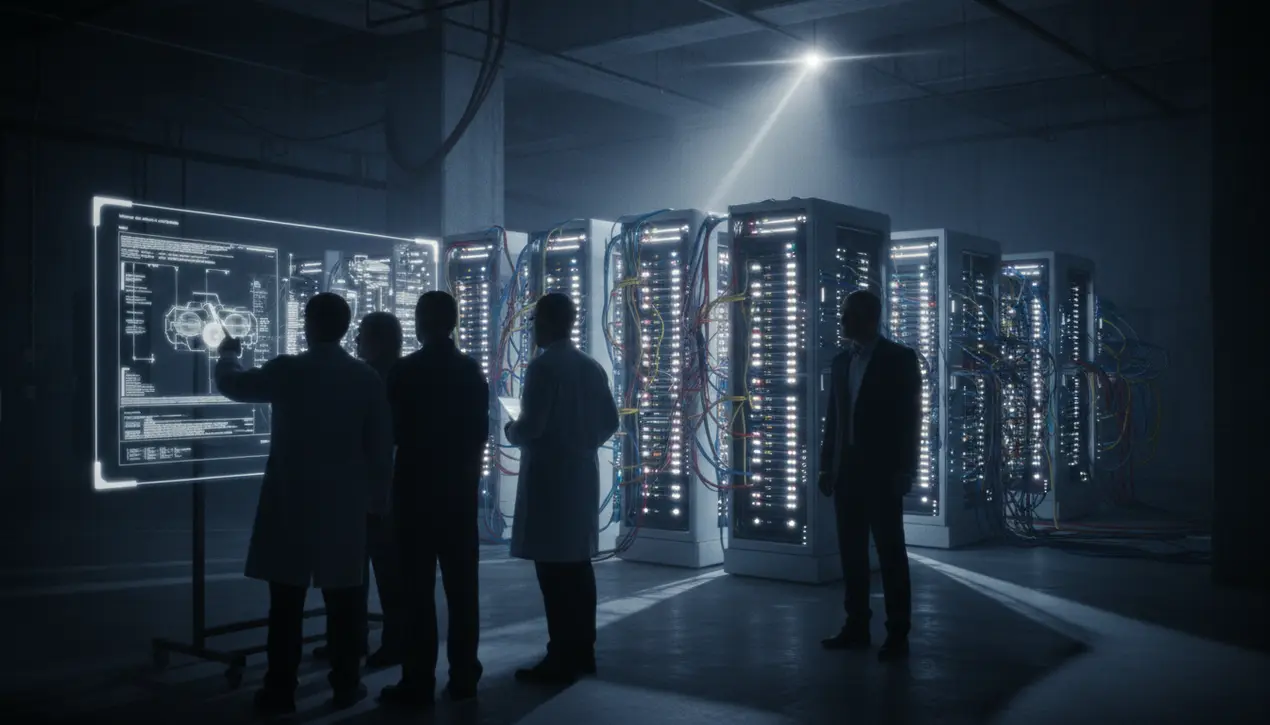
AIresearch & breakthroughsScientific Discovery via AI
White House Launches AI 'Manhattan Project' for Scientific Discovery
MI
Michael Ross
4 hours ago7 min read1 comments
The White House's newly unveiled 'Genesis Mission,' announced on November 24, 2025, represents a staggering federal commitment to artificial intelligence that its architects are boldly comparing to the Manhattan Project. This executive order mandates the Department of Energy to construct a 'closed-loop AI experimentation platform,' a unified system linking the nation's 17 national laboratories, federal supercomputers, and decades of accumulated government scientific data into a single, cooperative research engine.The stated priorities—biotechnology, critical materials, nuclear fission and fusion, quantum information science, and semiconductors—paint a picture of a generational leap in scientific capability. Yet, much like Isaac Asimov's fictional Foundation, which possessed both enlightened knowledge and profound societal influence, the Genesis Mission's true impact may lie not in its stated goals but in the intricate power dynamics it sets in motion.The order's text reveals an aggressive, legally binding timeline: within 60 days, the DOE must identify all federal and partner compute resources; within 90 days, catalog datasets and model assets; and within a mere nine months, demonstrate an initial operating capability for a scientific challenge. This breakneck pace underscores a national urgency, but it also raises immediate questions about oversight and the delicate balance between open scientific inquiry and national security, a tension Asimov himself often explored through his Three Laws of Robotics.The initiative's collaborator list reads like a who's who of American technological might, including Albemarle, Applied Materials, Collins Aerospace, GE Aerospace, and, most tellingly, the frontier AI labs themselves: OpenAI for Government, Anthropic, Google, Microsoft, and NVIDIA. These entities are framed not as contractors but as partners, suggesting a deep, structural integration of private-sector capacity into the very backbone of federal science.This public-private fusion is precisely where the most profound ethical and policy questions emerge. At a moment when leading AI labs are reportedly buckling under unsustainable compute costs—with documents analyzed by critic Ed Zitron revealing OpenAI's exploding cost structure and The Register inferring staggering losses from Microsoft's earnings—the Genesis platform could be perceived as a crucial piece of public infrastructure that indirectly subsidizes the very companies driving today's AI arms race.The executive order meticulously outlines the legal frameworks for this collaboration—standardized agreements for intellectual property, licensing, and data sharing—yet remains conspicuously silent on two critical fronts: funding and open-source development. No public cost estimate, explicit appropriation, or detailed breakdown of financial responsibility has been provided, leaving observers to speculate whether this will be funded by repurposed resources, future congressional appropriations, or heavy private-sector investment.Furthermore, the omission of any mention of open-source model development is a stark departure from earlier sentiments expressed by Vice President JD Vance, who, prior to assuming office, voiced skepticism of policies that entrench incumbent advantages. Instead, Genesis sketches a controlled-access ecosystem governed by classification rules and export controls, placing it firmly at the junction of open science and restricted national-security operations.The mission's core technological ambition—the development of AI agents capable of generating hypotheses, designing experiments, and directing robotic laboratories—is a explicit embrace of autonomous scientific discovery. This 'closed-loop' vision, where AI not only analyzes data but actively designs and runs physical experiments, could revolutionize fields from materials science to medicine.However, it also introduces novel risks related to AI system integrity, experiment traceability, and the potential for unforeseen consequences when autonomous agents operate at scale. For enterprise leaders, Genesis signals a future where federal norms for data governance, AI pipeline observability, and multi-cloud interoperability become de facto standards, particularly in regulated sectors like biotech and energy.The initiative does not change day-to-day operations today, but it strongly hints at a coming reality where efficiency, security, and modular AI infrastructure are not just competitive advantages but essential for partnership and compliance. Ultimately, the Genesis Mission is a monumental gamble.It could become a genuine engine for public good, accelerating discoveries that benefit all of humanity. Or, depending on how its access and governance are ultimately structured, it could become a foundational element cementing the dominance of a few private entities in the AI landscape. The administration has launched its modern Manhattan Project, but unlike its predecessor, the most powerful element it seeks to harness may not be atomic, but algorithmic—and its chain reaction will reshape the balance of power in science and technology for decades to come.
#Genesis Mission
#AI research
#national laboratories
#closed-loop system
#government data
#public-private partnerships
#enterprise AI
#editorial picks news
Stay Informed. Act Smarter.
Get weekly highlights, major headlines, and expert insights — then put your knowledge to work in our live prediction markets.
Comments
Loading comments...
© 2025 Outpoll Service LTD. All rights reserved.